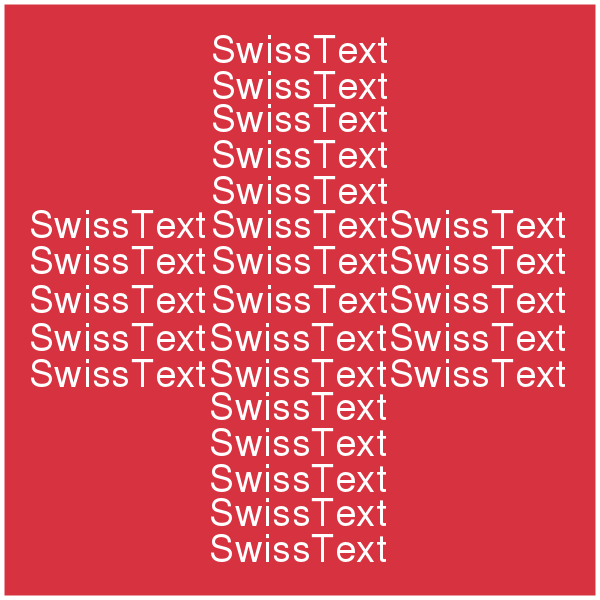Recordings
This page contains the video recordings for SwissText 2023. Loading might take some seconds, please be patient.
Keynotes
Keynote 1 – Towards Better Data Governance for Large Language Models
- Speaker: Anna Rogers
Keynote 2 – Text Categorization with Style
- Speaker: Jacques Savoy
Keynote 3 – Efficient Machine Learning in Low-Resource and Highly-Specific Domains
- Speaker: Diego Antognini
Keynote 4 – Digital Ink – Modern Processing of the Oldest Textual Form.
- Speaker: Claudiu Musat
Keynote 5 – Bringing natural language processing applications to Swiss organizations
- Speaker: Silvia Quarteroni
Tracks
The growing capabilities of transformer models pave the way for solving increasingly complex NLP tasks. A key to supporting application-specific requirements is the ability to fine-tune. However, compiling a fine-tuning dataset tailored to complex tasks is tedious and results in large datasets, limiting the ability to control transformer output. We present an approach in which complex tasks are divided into simpler subtasks. Multiple transformer models are fine-tuned to one subtask each, and lined up to accomplish the complex task. This simplifies the compilation of fine-tuning datasets and increases overall controllability. Using the example of reducing gender bias as a complex task, we demonstrate our approach and show that it performs better than using a single model.
Divide et Impera: Multi-Transformer Architectures for Complex NLP-Tasks
- Solveig Helland, Elena Gavagnin and Alexandre de Spindler
Improving Metrics for Speech Translation
- Claudio Paonessa, Dominik Frefel and Manfred Vogel
SwissBERT: The Multilingual Language Model for Switzerland
- Jannis Vamvas, Johannes Graën and Rico Sennrich
Does mBERT understand Romansh? Evaluating word embeddings using word alignment.
- Eyal Liron Dolev
Hybrid Long Document Summarization Using C2F-FAR and ChatGPT: A Practical Study
- Guang Lu, Sylvia Larcher and Tu Tran
Extracting sentence simplification pairs from French
comparable corpora using a two-step filtering method
- Lucía Ormaechea and Nikos Tsourakis
Large Language Model Prompt Chaining for Long Legal Document Classification
- Dietrich Trautmann
Adapting Large Language Models for Customer Request Handling An exploration of possible approaches
- Katsiaryna Mlynchyk and Alexandros Paramythis
Automated Metadata Anonymization with Machine Learning: an Open Source Application Showcase
- André Ourednik
VIAN-DH: Multimodal Data Analysis Software and Services
- Teodora Vukovic, Igor Mustač, Daniel McDonald, Johannes Graën, Nikolina Rajović, Jonathan Schaber, Tilia Ellendorff, Christoph Hottiger and Noah Bubenhofer
Enriching German News Articles with AI-Generated Content
- Nicole Herold and Juergen Vogel
20 Minuten: A Multi-task News Summarisation Dataset for German
- Tannon Kew, Marek Kostrzewa and Sarah Ebling
Evaluating a Multilingual Pre-trained Model for the Automatic Standard German captioning of Swiss German TV
- Johanna Gerlach, Pierrette Bouillon, Silvia Rodríguez Vázquez, Jonathan Mutal and Marianne Starlander
Spaiche: Extending State-of-the-Art ASR Models to Swiss German Dialects
- Clément Sicard, Victor Gillioz and Kajetan Pyszkowski
Exploring the potential of Open Text Data for Drug Repositioning: A Case Study in Glioblastoma Therapy
- Curdin Marxer, Heiko Rölke, Alex Alfieri and Marc-Eric Halatsch
